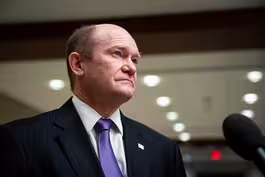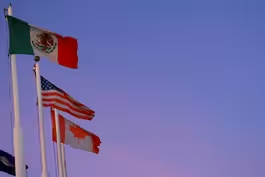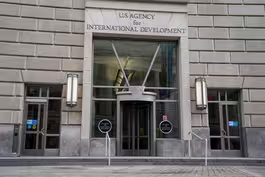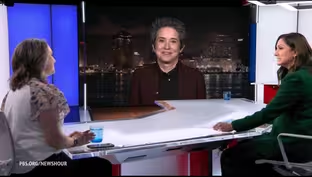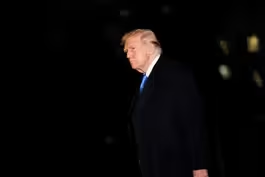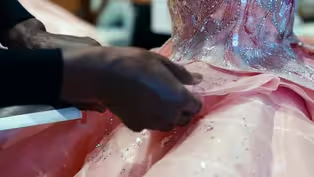
How tariffs work and the impact they have on the economy
Clip: 2/3/2025 | 5m 54sVideo has Closed Captions
A look at how tariffs work and the impact they have on the economy
President Trump's tariff plans are leaving people with many questions about when they have been used in the past, what kind of effect they have had, how that squares with the president's arguments and their potential impact now. Economics correspondent Paul Solman reports.
Problems playing video? | Closed Captioning Feedback
Problems playing video? | Closed Captioning Feedback
Major corporate funding for the PBS News Hour is provided by BDO, BNSF, Consumer Cellular, American Cruise Lines, and Raymond James. Funding for the PBS NewsHour Weekend is provided by...

How tariffs work and the impact they have on the economy
Clip: 2/3/2025 | 5m 54sVideo has Closed Captions
President Trump's tariff plans are leaving people with many questions about when they have been used in the past, what kind of effect they have had, how that squares with the president's arguments and their potential impact now. Economics correspondent Paul Solman reports.
Problems playing video? | Closed Captioning Feedback
How to Watch PBS News Hour
PBS News Hour is available to stream on pbs.org and the free PBS App, available on iPhone, Apple TV, Android TV, Android smartphones, Amazon Fire TV, Amazon Fire Tablet, Roku, Samsung Smart TV, and Vizio.
Providing Support for PBS.org
Learn Moreabout PBS online sponsorshipGEOFF BENNETT: The U.S., Canada and Mexico all agree to delay the start of President Trump's tariffs and hold off, at least for now, on the possibility of a trade war among allies.
But the delay is only for a few weeks, and, as of now, there will be new tariffs taking effect tomorrow, 10 percent on goods from China.
That's already on top of tariffs on Chinese products and materials dating back to President Trump's first term.
AMNA NAWAZ: President Trump also called the new tariffs on China a -- quote -- "opening salvo."
And he spoke this weekend about his plans to issue new punitive tariffs against another ally, the European Union.
These threats and the prospects of a trade war lead to a number of questions about how tariffs have been used in the past, what effect they have had, and their potential impacts now.
Economics correspondent Paul Solman takes a closer look.
PAUL SOLMAN: Tariffs, taxes on imports to the U.S. collected at 328 ports of entry across the country.
Here's a look at some of the reasons President Trump gives to hike them.
DONALD TRUMP, President of the United States: Instead of taxing our citizens to enrich other countries, we will tariff and tax foreign countries to enrich our citizens.
PAUL SOLMAN: Reason one, to raise money from foreigners, instead of taxing Americans.
President Trump insists tariffs were once the great revenue source for the United States, and it's true.
DOUGLAS IRWIN, Dartmouth College: Right up until the Civil War, tariffs raised 90 percent of the revenue for the federal government.
But the federal government was very small.
Spending was like 2 to 3 percent of GDP.
So there wasn't much to fund, except for the debt and the current expenditures, and the tariff did it.
PAUL SOLMAN: Today, government spending is almost a quarter of GDP.
How much do tariffs bring in?
DOUGLAS IRWIN: Today, it's only about 2 percent of federal revenue comes from the tariff.
It's just been swamped by corporate taxes, income taxes, Social Security taxes and things of that sort.
PAUL SOLMAN: But the point is to replace those taxes.
So how much more money can hire tariffs raise?
KIMBERLY CLAUSING, UCLA School of Law: If you look at total federal revenues in a typical year, they're over $4 trillion.
Almost $3 trillion of that is a combination of the individual income tax and the corporate income tax, whereas we think the maximum you could get out of tariffs, if you really pushed them to the highest level you could go, would be in the neighborhood of $800 billion, right?
So that's not going to come anywhere near what you need to even replace the individual income tax, let alone the corporate tax, payroll taxes and other types of tax on income.
PAUL SOLMAN: A second reason, tariffs to protect American industry from foreign competition, a la the future 25th president of the United States, William McKinley.
DOUGLAS IRWIN: So, William McKinley, as chair of the House Ways and Means Committee, ushered through a piece of legislation that became known as the McKinley tariff.
It was passed in 1890.
And it had revenue effects.
It was designed to protect domestic industry from foreign competition.
And, in particular, he, as representing the state of Ohio, was interested in helping out the steel industry, which was located in his district.
PAUL SOLMAN: President Trump has promised to help out various industries nowadays, citing McKinley.
DONALD TRUMP: President McKinley made our country very rich through tariffs and through talent.
PAUL SOLMAN: However, when McKinley became president in 1897: DOUGLAS IRWIN: The wasn't this massive boom.
We had, like, sort of a mini-depression in 1893 that lasted for several years.
And as president now, McKinley said, gee, if we could export manufactured goods and farm goods to the world, we could pull out of this recession and do much better.
And he changed tack.
In fact, he said the age of exclusion is past.
He also said commercial wars weren't productive.
And so he was a much more outward-oriented president than he was as a member of Congress.
PAUL SOLMAN: Plus, there's a problem with tariffs, countertariffs, which both Mexico and Canada threatened before today's delay.
JUSTIN TRUDEAU, Canadian Prime Minister: Canada will be responding to the U.S. trade action with 25 percent tariffs against $155 billion worth of American goods, such as American beer, wine, and bourbon, fruits and fruit juices, including orange juice, along with vegetables, perfume, clothing, and shoes.
It will include major consumer products like household appliances, furniture, and sports equipment, and materials like lumber and plastics, along with much, much more.
PAUL SOLMAN: Which would make our goods more expensive and thus hurt our exports.
And that raises the question, who pays for tariffs anyway?
According to research on the last Trump tariffs: AMIT KHANDELWAL, Yale University: So what we found in the 2018-2019 tariffs is that, when the U.S. imposed tariffs on predominantly Chinese goods, the U.S. economy and U.S. importers bore the full incidence of those tariffs.
And some of those costs would then trickle down and come back to consumers.
PAUL SOLMAN: Prices went up less than half-a-percent.
But the first Trump tariffs were just 15 percent on about 15 percent of U.S. imports, not much.
And, of course, the more and higher the tariffs, the more expensive for importers and consumers.
Moreover, they don't hit everyone equally.
DOUGLAS IRWIN: The tariff is a very regressive tax.
It hits lower-income households more than higher-income households.
So if we were to attempt to try to cut the income tax or replace the income tax with a tariff, we'd be going from a fairly progressive tax system to a very regressive tax system.
PAUL SOLMAN: Muscling other countries may be working, as Colombia's about-face on accepting deportees suggests when Trump threatened tariffs on Colombia.
As to protecting American manufacturing: DOUGLAS IRWIN: Well, here, it's a double-edged sword.
We'd help some industries, but we'd hurt others.
Economists see trade-offs, rather than sort of net creation of jobs and expansion of manufacturing, as a result of tariffs.
PAUL SOLMAN: What impact will the new tariffs actually have?
We will soon find out.
For the "PBS News Hour," Paul Solman.
Coons says USAID helps keep U.S. safe and should continue
Video has Closed Captions
Clip: 2/3/2025 | 6m 7s | 'This work needs to continue': Sen. Coons says USAID helps keep America safe (6m 7s)
How Trump's tariff threats could affect American consumers
Video has Closed Captions
Clip: 2/3/2025 | 5m 36s | Economist breaks down how Trump's tariff threats could affect consumers (5m 36s)
The potential national and global impact of USAID's closure
Video has Closed Captions
Clip: 2/3/2025 | 3m 43s | The potential national and global impact of USAID's closure (3m 43s)
Tamara Keith and Amy Walter on political response to tariffs
Video has Closed Captions
Clip: 2/3/2025 | 8m 47s | Tamara Keith and Amy Walter on the political response to Trump's tariff threats (8m 47s)
Trump moves to shutter USAID and eyes more agencies to close
Video has Closed Captions
Clip: 2/3/2025 | 8m 45s | Trump takes steps to shutter USAID and gives Musk unprecedented access to federal systems (8m 45s)
'Wicked' costume designer on his Oscar-nominated work
Video has Closed Captions
Clip: 2/3/2025 | 7m 19s | 'Wicked' costume designer Paul Tazewell on the vision behind his Oscar-nominated work (7m 19s)
Providing Support for PBS.org
Learn Moreabout PBS online sponsorship
- News and Public Affairs

FRONTLINE is investigative journalism that questions, explains and changes our world.

- News and Public Affairs

Amanpour and Company features conversations with leaders and decision makers.












Support for PBS provided by:
Major corporate funding for the PBS News Hour is provided by BDO, BNSF, Consumer Cellular, American Cruise Lines, and Raymond James. Funding for the PBS NewsHour Weekend is provided by...
